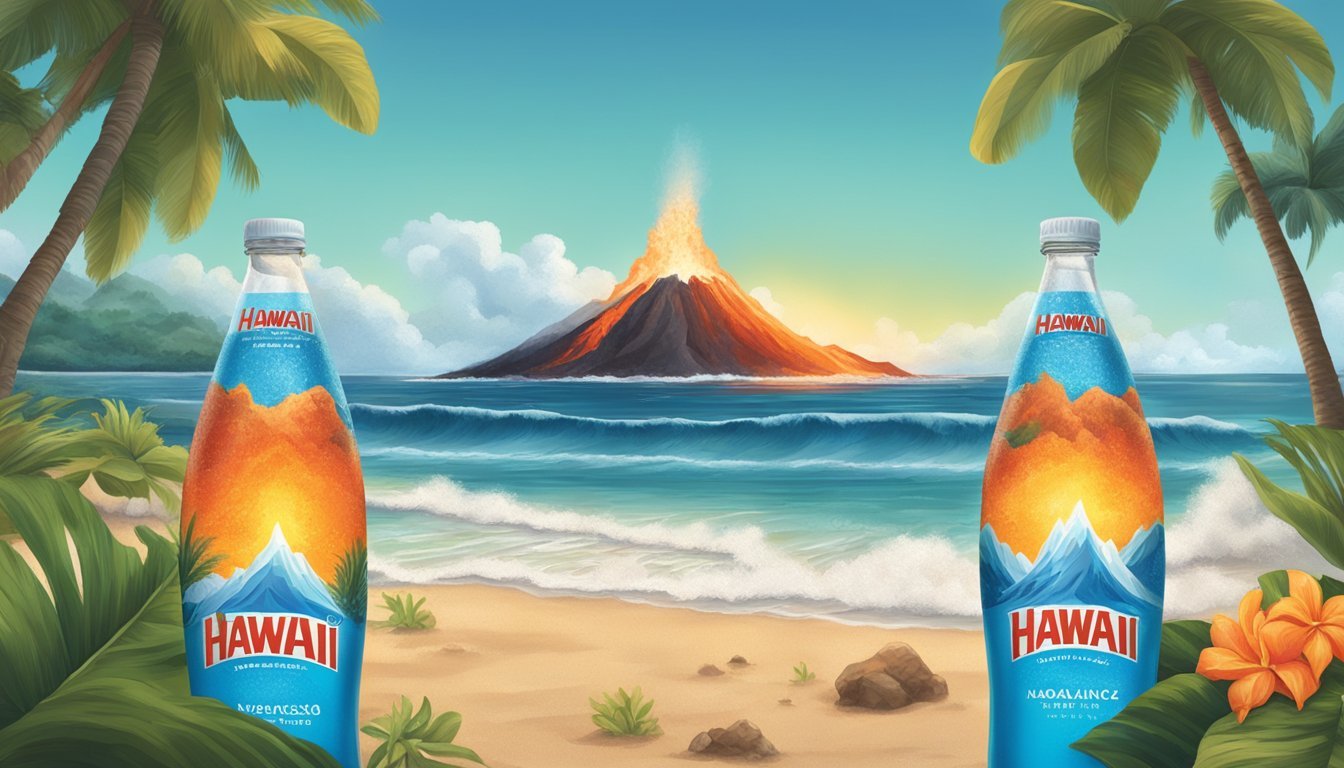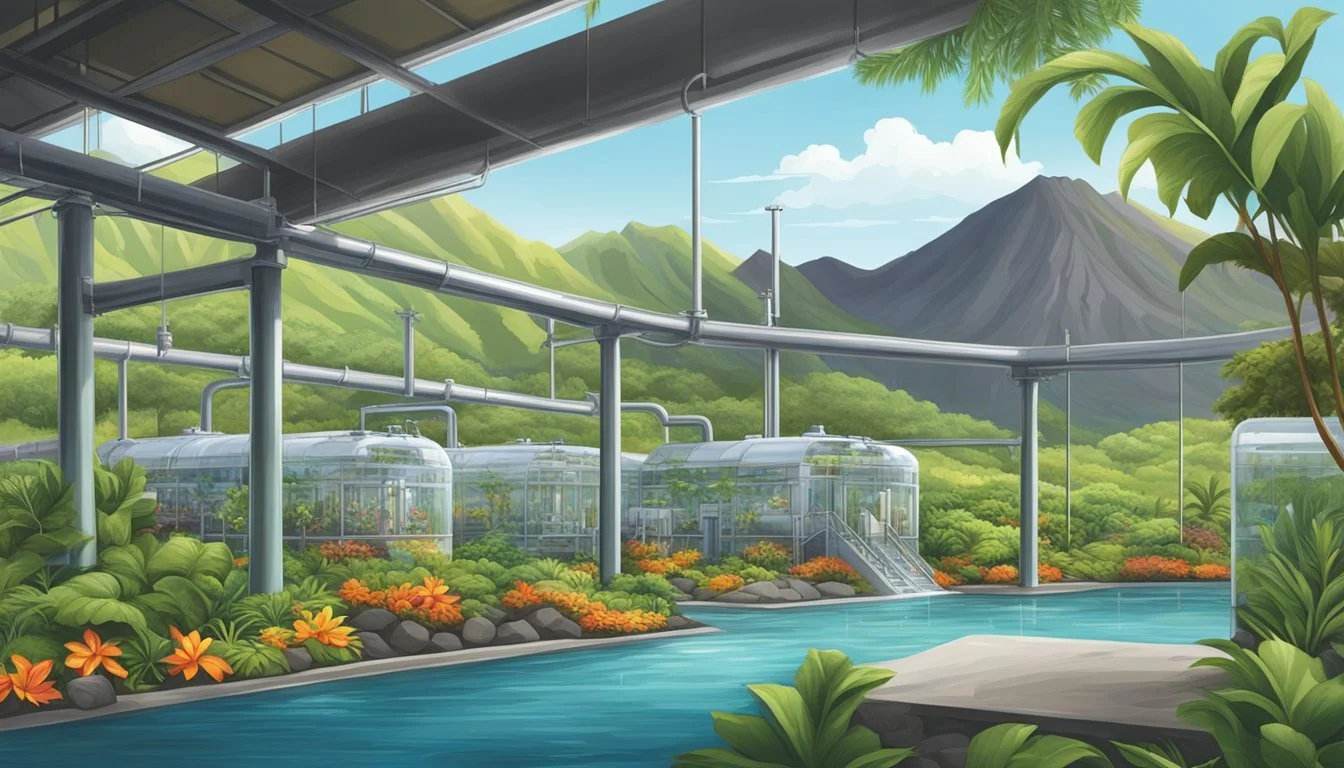Hawai’i Volcanic vs. Defy
Which Bottled Water Reigns Supreme?
When it comes to premium bottled waters, Hawai’i Volcanic and Defy are two brands that stand out in the market. Both offer unique features that appeal to health-conscious consumers, but there are distinct differences worth noting. For those seeking a naturally alkaline option, Hawai’i Volcanic boasts a pH level of around 8.8, which can help neutralize acidity in the body.
On the other hand, Defy positions itself as a performance water, emphasizing fitness and recovery benefits. It’s marketed toward athletes and active individuals looking for enhanced hydration and performance support. Comparatively, Defy uses advanced filtration and additional electrolytes to support these needs.
Ultimately, the choice between Hawai’i Volcanic and Defy largely depends on your personal health goals and lifestyle preferences. While Hawai’i Volcanic champions natural alkalinity and purity, Defy focuses on boosting athletic performance and recovery. Each has its own merits, providing a solid basis for making an informed decision.
Overview of Hawai’i Volcanic and Defy Bottled Water
Hawai’i Volcanic and Defy Bottled Water offer unique benefits to consumers, focusing on sustainability, origin, and distinct health properties.
Origin Story and Brand Mission
Hawai’i Volcanic: Originating from the Big Island of Hawaii, Hawai’i Volcanic water is sourced from the Mauna Loa Volcano. The brand emphasizes sustainability, filtering water through volcanic rock for natural alkalinity and mineral content. Their mission includes contributing to environmental preservation and community wellbeing by providing high-quality water products.
Defy: Defy water focuses on delivering high-performance hydration solutions. This brand is geared toward active lifestyles and athletes, promising electrolytes and added benefits for performance enhancement. Defy's mission integrates health optimization with a commitment to innovation.
Product Range
Hawai’i Volcanic: This brand offers naturally alkaline, lava-filtered water. Their range includes different bottle sizes, such as 1.0-liter bottles typically available in packs. The water boasts a smooth, slightly sweet taste and is rich in minerals and electrolytes. Packaging often involves 100% recycled plastic to support their environmental goals.
Defy: Catering to active consumers, Defy's product line includes various bottled water options enriched with electrolytes. The focus is on hydration for athletes and fitness enthusiasts. With sleek, branded bottles, Defy ensures both functionality and style, aiming to meet the rigorous demands of sporty lifestyles. Leafs packaging uses sustainable practices as per industry standards.
Comparative Analysis of Water Quality
When comparing Hawai’i Volcanic and Defy bottled waters, evaluating water quality involves examining their pH balance, mineral content, and presence of electrolytes.
PH Balance and Alkalinity
Hawai’i Volcanic water has a pH range of 7.6 to 8.5, making it alkaline. Alkaline water is often sought after for its potential benefits in balancing the body's pH levels. Defy water, though, typically maintains a neutral pH of about 7.0.
For consumers who prefer an alkaline drink, Hawai’i Volcanic may be more suitable. Alkaline water is believed to help neutralize acid in the bloodstream and improve metabolism, though scientific consensus varies.
Mineral Content and Health Benefits
Hawai’i Volcanic water, sourced from Mauna Loa’s volcanic rock, contains natural minerals such as silica, calcium, and magnesium. These minerals are important for overall health. Silica is noted for supporting bone, hair, skin, and nail health.
Defy water, meanwhile, enhances taste by adding mineral salts but may not match the natural abundance found in Hawai’i Volcanic. Natural minerals can contribute to various health benefits, making Hawai’i Volcanic attractive for those looking to supplement their diet with essential minerals.
Presence of Electrolytes for Hydration
Both Hawai’i Volcanic and Defy waters include electrolytes, crucial for maintaining hydration and supporting bodily functions. Hawai’i Volcanic boasts natural electrolytes absorbed through its volcanic filtration process. This may include potassium, sodium, and magnesium.
Defy water relies on added electrolytes to enhance hydration. While both offer hydration benefits, the source of these electrolytes differs. Hawai’i Volcanic’s natural origins might appeal to those who prefer fewer additives and more naturally occurring nutrients.
By comparing the pH balance, mineral content, and electrolytes, one can make an informed choice between these two options based on specific health and hydration needs.
Source and Filtration Process
Hawai’i Volcanic and Defy bottled water have distinct sources and methods of filtration, which significantly impact their purity, taste, and mineral content.
Natural Sources: Spring vs. Volcanic
Hawai’i Volcanic sources its water from the Mauna Loa volcano. When it rains, the water percolates through 14,000 feet of porous volcanic rock. This journey enriches the water with natural minerals and electrolytes.
In contrast, Defy sources its water from protected aquifers, typically fed by natural springs. Spring water comes from underground sources that rise to the surface, often filtered through layers of sand and rock.
While Hawai’i Volcanic benefits from volcanic filtration, which ensures high mineral content, Defy offers the purity of aquifer-fed spring water.
Filtration Techniques and Purity
The filtration process for Hawai’i Volcanic involves natural volcanic filtration. This process removes impurities as water travels through porous lava rock, ensuring a high level of purity and a naturally alkaline pH of 7.6 to 8.5.
Defy's filtration process typically includes multi-stage filtration systems. These may involve activated carbon, UV treatment, and reverse osmosis to remove contaminants. This method aims to deliver clean, pure water free from contaminants but without altering the natural mineral composition significantly.
Hawai’i Volcanic’s natural volcanic filtration and mineral content offer a unique taste profile, while Defy’s multi-stage filtration focuses on maximum purity.
Environmental Impact and Sustainability
Both Hawai’i Volcanic and Defy focus on minimizing their environmental impact through various sustainability practices and eco-friendly packaging solutions. The section below details their specific efforts in protecting the environment.
Eco-Friendly Packaging
Hawai’i Volcanic uses 100% recycled plastic (rPET) for their bottles. This approach significantly reduces the reliance on new plastic materials and supports the recycling industry. Additionally, their packaging is designed to be reusable, encouraging customers to refill rather than discard the bottles.
Defy also emphasizes eco-friendly packaging. They use biodegradable materials for their bottle labels and have committed to transitioning to 100% rPET bottles. Their packaging initiatives are part of a broader strategy to reduce plastic waste and promote a circular economy.
Sustainability Initiatives
Hawai’i Volcanic sources its water from natural rainfall filtered through volcanic rock, ensuring a sustainable water cycle that does not deplete local water resources. They bottle less than 0.003% of the water yielded at their source, reflecting a minimal environmental footprint. The company also engages in reforestation projects in Hawaii, contributing to local ecosystem restoration.
On the other hand, Defy integrates various sustainability initiatives into their operations. They invest in renewable energy sources for their production facilities and participate in clean water programs globally. These efforts help in reducing their carbon footprint and supporting communities in need of potable water.
Both companies demonstrate a strong commitment to sustainability, though their approaches and specific initiatives may differ.
Taste Profile and Consumer Preferences
For those interested in bottled water, the taste profile and the preferences of consumers can sway their choice between Hawai’i Volcanic and Defy. These factors often boil down to how each water brand's unique composition affects its flavor and appeal to various demographic groups.
Flavor Analysis
Hawai’i Volcanic is renowned for its crisp and refreshing taste. This unique flavor is attributed to the volcanic rock filtration it undergoes, which imbues the water with essential minerals like silica, known to enhance smoothness. On the palate, it offers a clean, slightly alkaline taste that many find invigorating.
Defy, on the other hand, has a more neutral and balanced flavor profile. With a focus on purity, its taste is often described as smooth and unintrusive, making it ideal for those who prefer a subtle, almost flavorless water experience. Athletes gravitate towards Defy for its hydrating efficiency without any overpowering taste that might interfere with their performance.
Market Trends and Taste Test Findings
Recent taste tests reveal distinct consumer preferences based on lifestyle and health goals. Hawai’i Volcanic tends to attract those who appreciate a natural, mineral-rich flavor. These consumers often prioritize wellness and are drawn to the brand’s clean and slightly alkaline taste, which they associate with health benefits.
Defy's market appeal is strong among athletes and individuals seeking a no-frills hydration solution. Taste tests show that its unobtrusive flavor is favored in scenarios requiring no additional taste distraction, such as during workouts or intense physical activities. The brand's crisp, clean taste is often highlighted in tests, appealing to a broad audience that values hydration efficacy and purity.
Comparing Health and Lifestyle Benefits
When assessing the health and lifestyle benefits of Hawai’i Volcanic and Defy bottled water, it's vital to focus on how each contributes to hydration and overall health, particularly for athletes and in daily consumption.
Hydration and Athletic Performance
Optimal hydration is essential for peak athletic performance. Hawai’i Volcanic water undergoes a natural filtration process through volcanic rock, enriching it with minerals such as silica, which supports hair, skin, and nail health. The water contains a high pH level, promoting balanced body fluids during intense physical activities.
Defy water, on the other hand, capitalizes on advanced filtration techniques to remove impurities, ensuring a pure and clean drinking experience. Athletes may prefer Defy for its crisp taste and effective rehydration properties. Its lower mineral content compared to Hawai’i Volcanic may be less beneficial for sustained mineral intake but offers immediate hydration with minimal processing.
Brand Notable Minerals Filtration Process Hawai’i Volcanic Silica, Alkaline minerals Natural volcanic rock filtration Defy Minimal Advanced impurity removal
Daily Consumption and RDI Compliance
Daily water intake should align with the Recommended Dietary Intake (RDI) for minerals and fluids. Hawai’i Volcanic provides beneficial minerals such as silica in addition to hydration. Silica is known for aiding collagen synthesis and promoting bone and skin health, making it a favorable choice for routine consumption.
Defy caters to those seeking a fundamental yet effective hydration solution. Its water lacks the additional minerals found in Hawai’i Volcanic, but complies with hydration guidelines, ensuring users meet their daily water requirements without added complexities. This could appeal to individuals who prefer water with fewer minerals, targeting basic hydration needs.
In summary, Hawai’i Volcanic offers enhanced mineral content, benefiting health beyond basic hydration needs, while Defy excels in providing pure, thirst-quenching water, essential for everyday hydration.
Cost and Accessibility
For consumers selecting between Hawai’i Volcanic and Defy bottled waters, cost and accessibility are vital factors. Their pricing and distribution channels influence their suitability for different markets and consumers.
Pricing Comparison
Hawai’i Volcanic water, sourced from the slopes of Mauna Loa, often commands a premium price owing to its purity and origin. Standard retail prices could range between $2 to $4 per bottle, reflecting its high-quality sourcing and packaging. Discounts or subscriptions may reduce costs slightly, but it remains towards the higher end of bottled water options available.
Defy water, known for its competitive pricing, typically falls within the $1 to $2 range per bottle. This brand offers customer-centric options like regular discounts and subscription services, making it a cost-effective choice for those looking for regular, high-quality bottled water without breaking the bank. Seasonal promotions and bulk purchase deals add further financial flexibility.
Availability and Distribution Channels
Hawai’i Volcanic leverages its unique Hawaiian origin in its branding, and while it is prominently available across the United States, especially in high-end grocery stores and specialty shops, its distribution can be more limited compared to mass-market brands. The company might distribute directly through vetted health stores and online platforms dedicated to premium products. This selective availability underscores its niche market positioning.
Defy benefits from a more extensive distribution network. It's readily available in numerous retail chains, grocery stores, and convenience marts throughout the United States. The brand also enjoys a robust online presence, ensuring easy access for consumers who prefer to shop from home. Subscription services offered directly from their website provide further convenience for regular customers.
Consumer Engagement and Brand Offers
Hawai'i Volcanic and Defy engage consumers through different loyalty programs and subscription services. These initiatives aim to foster brand loyalty and provide added value to customers.
Loyalty Programs
Hawai'i Volcanic offers a loyalty program that rewards customers for frequent purchases and engagement. Customers earn points for every bottle purchased, which can be redeemed for discounts or exclusive merchandise related to the brand. The program emphasizes sustainability, encouraging users to participate in eco-friendly initiatives.
Defy also has a robust loyalty program. Customers accumulate points not only through purchases but also by participating in brand activities like sharing their experiences on social media or staying informed through newsletters. These points can be exchanged for a variety of rewards, such as free products or special event invitations. Both brands utilize their loyalty programs to build a dedicated customer base while offering unique incentives.
Subscription Services
Hawai'i Volcanic provides subscription services that deliver bottled water directly to the consumer’s doorstep. Subscribers can choose from different plans based on their usage needs, such as monthly or bi-monthly deliveries. The service often includes perks like free shipping and early access to new products. This convenience allows consumers to consistently receive their preferred water without the hassle of reordering.
Defy similarly offers subscription plans. These plans cater to various customer needs, including options for different water types and quantities. Subscribers benefit from discounts compared to one-time purchases and often receive additional perks such as samples of new flavors or products. Through these subscription services, both brands aim to ensure consistent customer engagement and satisfaction.
More About Hawai’i Volcanic
Acqua Pana vs Hawaii Volcanic: Which Bottled Water is Better?
Antipodes vs Hawaii Volcanic: Which Bottled Water is Better?
Aqua Carpatica vs Hawaii Volcanic: Which Bottled Water is Better?
Arrowhead vs Hawaii Volcanic: Which Bottled Water is Better?
Boxed Water vs Hawaii Volcanic: Which Bottled Water is Better?
Castle Rock vs Hawaii Volcanic: Which Bottled Water is Better?
Core Hydration vs Hawaii Volcanic: Which Bottled Water is Better?
Deer Park vs Hawaii Volcanic: Which Bottled Water is Better?
Hawaii Volcanic vs 1907water: Which Bottled Water is Better?
Hawaii Volcanic vs Alkaline88: Which Bottled Water is Better?
Hawaii Volcanic vs Big Chill: Which Bottled Water is Better?
Hawaii Volcanic vs BodyArmor: Which Bottled Water is Better?
Hawaii Volcanic vs Cascade Mountain: Which Bottled Water is Better?
Hawaii Volcanic vs CBD Living: Which Bottled Water is Better?
Hawaii Volcanic vs Crystal Geyser: Which Bottled Water is Better?
Hawaii Volcanic vs Crystal Lake: Which Bottled Water is Better?
Hawaii Volcanic vs Essence pH10: Which Bottled Water is Better?
Hawaii Volcanic vs Kirkland Signature: Which Bottled Water is Better?
Hawaii Volcanic vs Liquid Death: Which Bottled Water is Better?
Hawaii Volcanic vs Open Water: Which Bottled Water is Better?
Hawaii Volcanic vs Proud Source: Which Bottled Water is Better?
Hawaii Volcanic vs Pure Life: Which Bottled Water is Better?
Hawaii Volcanic vs Purely Sedona: Which Bottled Water is Better?
Hawaii Volcanic vs Richard's Rainwater: Which Bottled Water is Better?
Hawaii Volcanic vs Simple Truth: Which Bottled Water is Better?
Hawaii Volcanic vs Talking Rain AQA: Which Bottled Water is Better?
Hawaii Volcanic vs Weird Water: Which Bottled Water is Better?
Hawaii Volcanic vs Whole Foods 365: Which Bottled Water is Better?
Hawaii Volcanic vs Whole Foods Italian Still Mineral water: Which Bottled Water is Better?
Hawaiian Springs vs Hawaii Volcanic: Which Bottled Water is Better?
Ice Mountain vs Hawaii Volcanic: Which Bottled Water is Better?
Icelandic Glacial vs Hawaii Volcanic: Which Bottled Water is Better?
Just Water vs Hawaii Volcanic: Which Bottled Water is Better?
Mountain Valley Spring Water vs Hawaii Volcanic: Which Bottled Water is Better?
Nestle Pure Life vs Hawaii Volcanic: Which Bottled Water is Better?
Poland Spring vs Hawaii Volcanic: Which Bottled Water is Better?
San Pellegrino vs Hawaii Volcanic: Which Bottled Water is Better?
Smartwater vs Hawaii Volcanic: Which Bottled Water is Better?
Solan de Cabras vs Hawaii Volcanic: Which Bottled Water is Better?
Topo Chico vs Hawaii Volcanic: Which Bottled Water is Better?
Zephyrhills vs Hawaii Volcanic: Which Bottled Water is Better?






